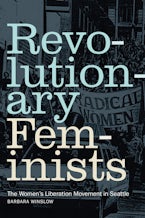“Barbara Winslow brings her historian’s sensibilities, political perspicacity, personal knowledge, and perfect comedic timing to tell a story of women’s liberation in Seattle that effectively overturns the conventional wisdom about the roots and branches of radical feminism. Winslow and her awesome comrades built a movement that, from its inception, was class conscious, Marxist-oriented, antiracist, anti-imperialist, nonsectarian, cross-generational, and ahead of the nation in its fight for reproductive justice, free childcare, and sexual freedom. They made mistakes and wrestled with internal contradictions but never lost sight of their objective: world revolution. Seattle, it turns out, was not only the greenest place in the country; it may well have been the reddest.”
- Robin D. G. Kelley, author of (Freedom Dreams: The Black Radical Imagination) “In this comprehensive study of women’s liberation in Seattle, Barbara Winslow carefully excavates a history that is quite different from the ones that have been told about less radical movements on the East Coast. With deep archival and personal knowledge, she illuminates the role of socialist feminists within women’s liberation, complicating the movement’s history in ways that intervene in today’s debates about feminism’s relationship to race, reproductive politics, capitalism, and US imperialism. An impressive and distinctive work.”
- Felicia Kornbluh, coauthor of (Ensuring Poverty: Welfare Reform in Feminist Perspective) "Forcefully pushing back against criticism that the organizations behind the movement, including her own Radical Women, advanced a white, middle-class agenda and ignored the needs of women of color, Winslow highlights their anti-imperialist and anti-capitalist perspectives and focus on issues of childcare, and notes the involvement of Black feminist luminaries including Nina Harding. . . . Worthwhile. . . ."
(Publishers Weekly) "The writing’s strength lies in its thoroughness of detail and commitment to giving voice to small, grassroots organizations that might otherwise be overlooked. . . . Recommended for readers with an interest in political science, U.S. history, and feminist or diversity studies."
- Monique Martinez (Library Journal) "Winslow has produced a valiant testament to radical women, left-wing feminism and the city of Seattle. It is a history that both needed to be told. . . . [A] crucial addition to the already expansive library focused on that period we still call the Sixties."
- Ron Jacobs (Counterpunch) "Winslow stresses that the women’s movement in Seattle has not been given its due by historians who have typically focused more on feminist demands in East Coast cities. Winslow now seeks to set the record straight, and she succeeds in doing so. . . . Recommended. All readers." - P. D. Travis (Choice) "Reading this book spurs my own urgency at a local level to collect, keep, and tell the stories of struggles even in seemingly progressive spaces. The strength of the book lies in Winslow’s connection to the work on the ground, her own archival records, and her exhaustive research." - Yesenia Navarrete Hunter (The Global Sixties) "Beyond documenting feminist activism in a forgotten and important corner of the United States-a major contribution in itself-Winslow points us toward new historical themes to consider as today’s more inclusive feminist activists and scholars raise new questions and build new bridges." - Blake Slonecker (Pacific Historical Review) "Outstanding design by Duke University Press, the inclusion of large black-and-white photographs, newspaper clippings, and an anti–Vietnam War speech by Winslow, and a very useful map of Seattle add a great deal to the text. Short biographies of Seattle-based socialist feminists, including what they did in their later years, are inspiring and help readers keep track of the many leaders and organizations. The glossary of terms related to Left organizing is particularly useful for readers unfamiliar with divisions within the U.S. Left, or unfamiliar with Marxist theory. In addition to Winslow’s lively narrative and sharp analysis, these features make Revolutionary Feminists a good choice for both undergraduate and graduate courses in U.S. women’s history or feminist studies." - Tamar W. Carroll (Journal of American History)

